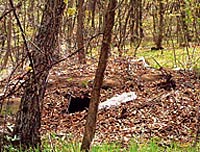




SEOUL—Two North Korean couples now living as refugees in South Korea dug holes high in the mountains of northeast China to hide from police—living there for years despite bitter cold and the constant threat of starvation.
"We went to the mountain on March 19, [2000]," defector Sung Kyung-il told RFA’s Korean service. "The ground was frozen so we could not dig very deep."
Sung, now resettled with his wife Chu Myung-hee in the southern South Korean city of Daegu, said the couple had endured the freezing nights and lack of food for two years on Dokgol Mountain in China's Jilin Province for fear of being apprehended and sent back to North Korea.
"As more North Korean people came to the town, more inspections took place. Other North Koreans were mostly single men, but I had a wife. I was so agitated I decided to go into the mountains," Sung said.
Both husband and wife asked to be identified by pseudonyms.
The place was untouched by humans. So we dug a hole and got rid of the mud on the top and put pebbles on the bottom, so that water would stay in the hole. And we built a house around an elm tree, next to the water.
"The place was untouched by humans. So we dug a hole and got rid of the mud on the top and put pebbles on the bottom, so that water would stay in the hole. And we built a house around an elm tree, next to the water."
Chu added: "Now we are sitting here and talking about the time when we built the house, but it was so painful then. We had to cut the trees and saw wood while we were hungry. We were never fed enough. But we thought we must live."
Chu and Sung concealed their shelter by digging it into a slope and planting grass and foliage as camouflage, they told RFA.
Meanwhile, on Maban Mountain in the same province, another North Korean couple had also dug a hole to live in, concealing it with leaves.
They hardly expected to remain there for the next seven years, according to another North Korean defector who visited them there. Neither husband nor wife wished to be identified even by a pseudonym.
The defector, who asked to be identified by the pseudonym Kim Myung-chul, said the couple had a radio with them. "So they used some car batteries and listened to South Korean programs, RFA radio programs, and Echo of Hope programs," Kim said.
They were able to receive shortwave radio, he said, "because they lived on the front side of the mountain, in a relatively high altitude area."
"I visited them and slept in the hole for a few nights and learned that they did not plan to live in the hole. They thought going to China would guarantee food and survival. But when they came to China, the reality was harsh," Kim said.
"For North Koreans in China, the word 'repatriation' is more dreadful than the word 'death,'" Kim said.
Sung said he had received full training in survival and camouflage techniques, which along with his skills as a professional builder, he and his wife had put to good use during their two years in the mountains.
Speaking together and finishing each other’s sentences, Sung and Chu described the massive effort required simply to stay alive.
"Due to the humidity in the cave, we built the stone flues on the floor for heating. When we didn't heat the floor, the moisture came up from the ground and trees. So we had to put many layers of paper on the floor," they told RFA.
...We had to have some food stored for winter time. So we dried some vegetables and mushrooms. We took some of the dried food to the town. Then people gave us some kimchi out of pity. Kimchi was the food that I always craved. Sometimes, we dug up and ate the potatoes we planted, even though they were not ripe, because we had no other food.
"And we had to have some food stored for winter time. So we dried some vegetables and mushrooms. We took some of the dried food to the town. Then people gave us some kimchi out of pity. Kimchi was the food that I always craved. Sometimes, we dug up and ate the potatoes we planted, even though they were not ripe, because we had no other food," they said.
Unofficial aid workers and missionaries estimate that at least 100,000 North Koreans are currently living secretly in China.
Beijing regards the North Koreans as as illegal economic migrants and routinely repatriates them, regardless of their claims for refugee status.
Often raped, trafficked, and otherwise abused in China, many returned defectors and their families face labor camp for attempting to defect from the isolated Stalinist state.
Original reporting by Jinseo Lee of RFA’s Korean Service. Service director: Jaehoon Ahn. Produced for the Web in English by Luisetta Mudie and Sarah Jackson-Han.